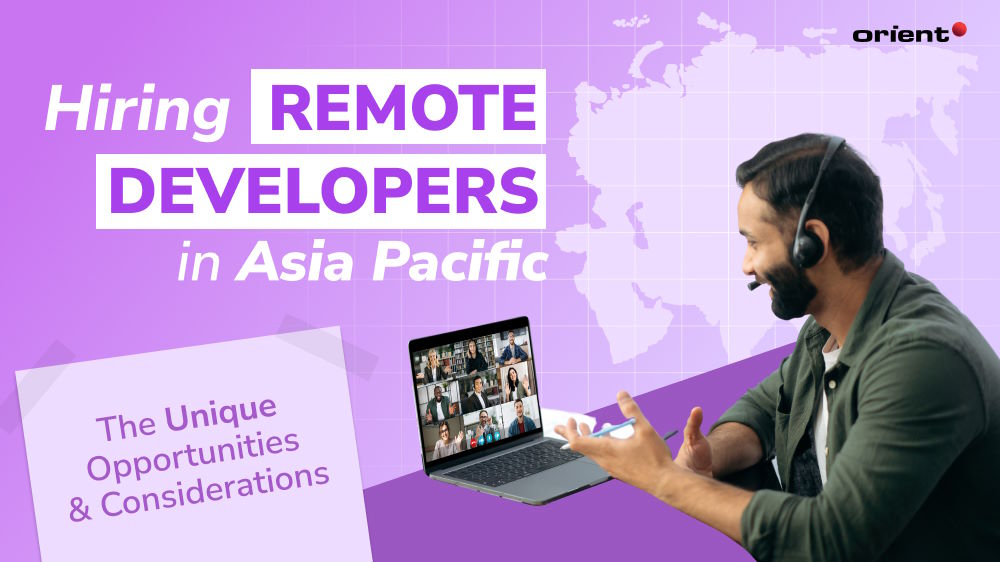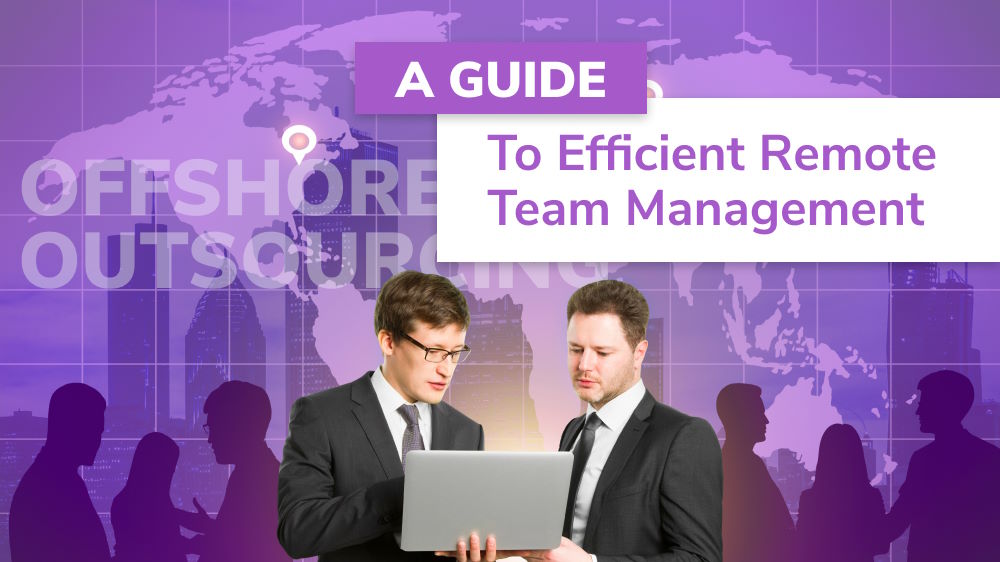The Unique Opportunities and Considerations When Hiring Remote Developers in Asia Pacific

Content Map
More chaptersIn light of the COVID pandemic, as well as advancements in video conferencing and online collaboration software, remote work has become the new normal for many people. And with this change comes a lot of benefits, for employers and employees alike. For employers, they benefit from a happier, more productive workforce, while employees get to enjoy more flexible work hours, improved work life balance, and less (if any) commute times.
However, when the time comes to hire remote developers, several unique challenges arise. Differing time zones, culture clashes, communication delays, and mismanagement can quickly send the development cycle into a tailspin. Here’s how to hire remote developers that contribute to the success of your project.
Why Hire Remote Developers?
If you’re an employer, you may be wondering why you should hire remote developers. After all, you can just as easily find great talent in your own backyard, right? Maybe. But there are good reasons to take your search beyond your local region.
For starters, you will have access to a much broader talent pool. What this means is, you are more likely to find the right developers for your project, even if they’re not in the same part of the world as you.
Also, you may have a higher chance of finding talent with specialist skills and knowledge; the kind of specialist experience that, depending on where you work, may be in short supply or completely unavailable.
Lastly, hiring remote developers can augment the skills and capabilities of your existing team. If you have a small, short-term project, but you lack the in-house expertise to pull it off, then outsourcing would be a sustainable way to fill those skills gaps. As a result, you get the right talent for the job, and your employees get the assurance that their positions at your organization are secure.
The Benefits of Hiring Remote Developers in the Asia-Pacific Region
When hiring remote workers, there are many parts of the world you can turn to. But no matter where you look, there are a few common traits you probably want out of a remote worker, regardless of location.
Chances are, you probably want a developer with relevant technical experience. You also probably want someone who has strong communication skills, a friendly and personal attitude, a clear understanding of your business – including your challenges and goals –, and access to the latest software development tools.
With this in mind, there are a few good reasons why you should look to hire remote developers in the Asia-Pacific region.
Access to Huge Talent Pool
According to research from Worldometer, a website that provides insightful and time-relevant world statistics, the Human Capital Index (HCI) for the Asia-Pacific region is rising. The HCI is an international metric that measures the estimated amount of knowledge, skills, and health that a child born today will accumulate throughout their life, enabling them to become productive members of society.
In places like Vietnam, Singapore, and Japan, the HCI scores are 0.7, 0.9, and 0.8 respectively. What this means is that countries in the Asia-Pacific region are increasingly mobilizing the economic and professional potential of their citizens, enabling them to better service both local and international markets, which is great news for companies looking to outsource to this region.
Strong Development and Programming Talent
Development, programming, and other technological skills are consistently listed as one of the top skills in the Asia-Pacific region.
According to data from the Global Skills Index 2020 report, Vietnam is rated second in technology skills in Asia Pacific and 22nd globally. The report states that the nation’s strongest skills in the technology domain are Android and iOS software development, followed by computer networking, human-computer interaction, databases, and software engineering.
Elsewhere, according to a report by SkillsFuture Singapore, technology skills such as Technology Development, Data Engineering, and the Internet of Things are the three most in-demand, tech-heavy roles. In Singapore, Digital Economy jobs are necessary across all 23 sectors with Industry TRansformation Maps or ITMs. And digital skills are increasingly transferable across different sectors as more enterprises embark on digital business transformation.
Affordable International Rates
Speaking of affordable, hiring remote developers in Asia Pacific can help businesses save a lot of money. Remote developers in Singapore can expect to make $71,408 USD per year, while remote developers in Vietnam can expect to make $45,848 USD per year. Of course, these rates can vary considerably based on the employee’s level of education, years of experience, technical expertise, and the current skill demands in the job market.
With that being said, however, these rates do compare favorably to other parts of the world. Take for example the United States, where US software developers can expect to earn over $120,000 USD. For companies that need software development services, but cannot afford such rates, outsourcing to countries in the Asia-Pacific region, such as Singapore and Vietnam, could save them a lot of money and enable them to build the software they need to gain a competitive edge.
Considerations to Watch Out For
As you read at the start of this article, there are many challenges that are unique to hiring offshore talent.
Typically, these challenges do not occur when you hire local talent, as they relate to factors that are unique to offshore workers, including the potential for different time zones, work ethics, cultural beliefs, communication styles, and quality standards.
Here are a few challenges to keep in mind when hiring remote developers in Asia Pacific and across the world:
Different time zones
Depending on your proximity to the APAC region, there may be significant time zone differences. If you are a client based in Sydney, Australia, you can expect to be ahead of a development team in Singapore by just two hours. This means you will both be working together at roughly the same time, with slightly different start and end times for each day.
However, if you are a client based in London, UK, you can expect to be 6 hours behind a place like Vietnam. Under these circumstances, both you and the development team should be realistic about your ability to collaborate in real-time, so there should be a precedent on the development team to provide frequent updates, giving you a chance to monitor progress, and submit comments and feedback.
Communication skills
Generally speaking, the Asia-Pacific region has a high level of English language proficiency. This means that, no matter where you look, you can expect to hire remote developers that are proficient in the English language.
This finding is reflected in the most recent English Proficiency Index (EPI) report by Education First. Here, the countries that were most proficient in English were Singapore (10th globally, score 611), the Philippines (27th globally, score 592), Malaysia (30th globally, score 547), South Korea (32nd globally, score 545), and Hong Kong, China (33rd globally, score 542).
Of course, you should always analyze the verbal and written communication skills of a developer or development company before you hire them. This will ensure that you can understand one another and collaborate effortlessly with zero trouble.
Quality standards
When hiring remote developers, it’s important that who you hire adheres to the highest quality standards. These standards include the ISO Standard 9001, which sets out the criteria for a quality management system, and ISO Standard 27001, which sets out the requirements for an information management security system. There are many other quality standards that are specific to software development, but these two are some of the most important out there.
These quality standards are set in place to improve the quality of the products and services you receive, as well as protect the security of your assets, such as financial information, intellectual property, employee details, and other information entrusted by third parties.
Therefore, when searching for developers, make sure they have the proper certifications and are certified by reputable organizations, such as the BSI Group, who provide auditing, certification, and training around the world.
Hire the Best Remote Developers for Your Project

Whether your software development needs are big or small, hiring remote developers is a fantastic way to extend the capabilities of your existing team, which in turn, enables you to provide better value to your customers.
For more information about our remote software development services, contact us. We’ll take the time to understand your needs and help you build the perfect team for your project.
With over 15 years of experience empowering businesses around the world, we are confident in our ability to upgrade your team and provide high-quality software development services that exceed expectations.







